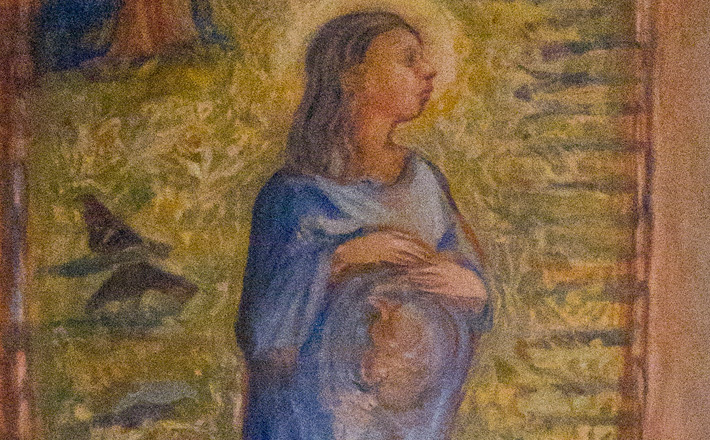Commentary on Psalm 80:1-7, 17-19
When a psalm is divided up, like the one for this Sunday (verses 1-7, 17-19), the integrity of the psalm is lost.1
Then the beautifully intertwined words of lament to God and praise of God are lost. First of all we need to respond to these concerns.
In the case of Psalm 80, the structure easily discerned as a common refrain is repeated after each of the three sections of the psalm:
“Restore us, O God;
let your face shine, that we may be saved” (verses 3, 7, 19).
The three sections of the psalm are thus defined as a cry to God to save (verses 1-3), followed by the identity of the plight of the northern kingdom (verses 4-7), and concluding with the familiar imagery of Israel as the vine planted by God (verses 8-19).
The psalm is identified in general as a lament in response to a national disaster. In this case it would appear that this is the fall of the northern kingdom of Samaria to the Assyrians in 722 BCE. This is supported by references to the northern tribes of Joseph, Ephraim, Benjamin and Manasseh (verses 1-2).
The opening cry of lament comes as a plea to God:
“Give ear. O Shepherd of Israel,
you who lead Joseph like a flock!” (verse 1).
The image of God as shepherd is a beloved image of God in Psalm 23 and elsewhere is an image that is the focus of Jesus’ identity in John 10:1-18. In these verses Jesus expresses his identity in the “I, I AM” shepherd passages: “I, I AM the good shepherd. The good shepherd lays down his life for the sheep” (10:11), and “I, I AM the good shepherd. I know my own and my own know me, just as the Father knows me and I know the Father, and I lay down my life for the sheep” (10:14-15). Jesus comes as the fulfillment of the Shepherd of Israel.
Another image in these opening verses recalls God’s presence with the cover of the ark of the covenant on which two cherubim face each other, symbolizing the living presence of God enshrined in the ark of the covenant:
“You who are enthroned upon the cherubim, shine forth
before Ephraim and Benjamin and Manasseh.
Stir up your might, and come to save us!” (verses 1b-2).
Having claimed the saving power of God, the psalm concludes with the first of the three refrains claiming God’s presence to save:
“Restore us, O God;
let your face shine, that we may be saved” (verse 3).
The second section of the psalm identifies concern for the plight of the northern kingdom. The psalmist envisions that God’s anger has been kindled against distrusting king Ahaz who refuses to accept God as his only ally:
“O LORD God of hosts,
how long will you be angry with your people’s prayers?” (verse 4).
The lament of the psalmist is expressed in the imagery of God’s refusal to evenaccept the prayers of the people that ascend to his nostrils.
The imagery of “the bread of tears” indicates the depth of the psalmist’s lament as the sustenance of bread and water is identified with the people who have turned from God:
“You have fed them with the bread of tears,
and given them tears to drink in full measure” (verse 5).
Even their neighbors have joined in the rejection of God’s people with scorn and laughter:
“You make us the scorn of our neighbors;
our enemies laugh among themselves” (verse 6).
In the midst of their despair we hear the refrain for the second time calling forth the presence of God’s face to shine upon them in the gift of salvation:
“Restore us, O God;
let your face shine, that we may be saved” (verse 7).
The intervening verses omitted in the lectionary reading for this Sunday (verses 8-16) bring forth the third section of the psalm. These verses focus on the imagery or allegory of Israel as the vine planted by God. The story begins with the Red Sea deliverance of the people from Egypt (verse 8), and leads into the blessing of being rooted and branching out in prosperity from the sea to the River throughout the land to which they are led by God (verses 8-13).
The cry of the psalmist returns to call forth God’s favor to look down upon the vine and have regard to its favor after being burned and cut down (verses 14-16).
The lectionary returns to the concluding three verses of the psalm to hear the plea for God to once again reveal his right hand of honor, favor and strength:
“But let your hand be upon the one at your right hand,
the one whom you made strong for yourself” (verse 17).
With this request the psalmist promises faithfulness by the people:
“Then we will never turn back from you;
give us life, and we will call on your name” (verse 18).
The closing verse of the psalm repeats for the third time the prayer of the psalmist for the face of God to shine in favor upon the people:
“Restore us, O God;
let your face shine, that we may be saved” (verse 19).
Through this psalm we hear the all too familiar story of people falling away from the God of salvation and trusting in human reliance. The lament is real and the depth of rejection is deeply felt. The plea to God to save is desperate. The lament and agony of these words and the hope of returning to God’s promise of life is to be heralded in this season.
In the companion reading for this Sunday from Isaiah 7:10-16, we hear the word of the prophet warning king Ahaz against putting his trust in a foreign alliance with Assyria. The promise of deliverance from threatening powers will be in a sign of a young woman who “is with child and shall bear a son, and shall name him Immanuel” (Isaiah 7:14). In our gospel reading from Matthew 1:18-25, the evangelist receives the words of Isaiah the prophet as ultimately brought to fulfillment in the birth of Jesus the Messiah:
“All this took place to fulfill what had been spoken by the Lord through the prophet:
‘Look, the virgin shall conceive and bear a son,
and they shall name him Emmanuel,
which means, “God is with us.”‘ (1:22-23).
On this Fourth Sunday of Advent we hear in these scriptures the promise of Isaiah, the hope of the psalmist, and the word of fulfillment in Jesus Christ. Thanks be to God. Amen.
Notes:
1 This commentary was originally published on the site on December 19, 2010.


December 18, 2016